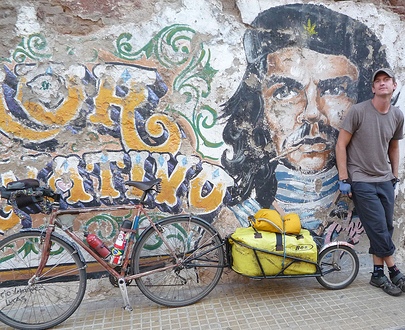
FORWARD: (Buenos Aires, Argentina) As far as the internet world is concerned I’ve been thin air for the last three weeks. My inbox is littered with e-mails awaiting responses and this blog has been time-frozen on my last post, a hodgepodge of generalizations about a retrospectively paradisiacal country called Uruguay. Much has happened since then. I took a boat across a dirty river called the Mar de Plata, entered a new country Argentina, was visited by friends and reunited with others, pedaled half the city’s streets and walked the other half’s avenues, rented a house with three social Argentines, organized samba classes, and learned that my brother will marry. There is no shortage of topics to write about. It may come as a surprise then that after such an extended silence, with so many new happenings in hand, I choose to share quotes from a 900-page book about India. “Shantaram: A Novel ” by Gregory David Roberts, an Australian convict who escaped to Bombay to begin a new life, has been just below the surface of these past three weeks, a slowly scrolling movie in my mind, or music in my headphones that no one else could hear. In so many words, it’s the most interesting book I’ve ever read. For more information about the book Shantaram click here
” by Gregory David Roberts, an Australian convict who escaped to Bombay to begin a new life, has been just below the surface of these past three weeks, a slowly scrolling movie in my mind, or music in my headphones that no one else could hear. In so many words, it’s the most interesting book I’ve ever read. For more information about the book Shantaram click here .
.
#######################################################################################################################
“Every free minute is a short story with a happy ending.”
“…every human will has the power to transform its fate. I’d always thought that fate was something unchangeable…but I suddenly realised that life is stranger and more beautiful than that. The truth is that, no matter what kind of game you find yourself in, no matter how good or bad the luck, you can change your life completely with a single thought or a single act of love.”
“Poverty and pride are devoted blood brothers until one, always and inevitably, kills the other.”
“You can never tell what people have inside them until you start taking it away, one hope at a time.”
“There’s a truth that’s deeper than experience. It’s beyond what we see, or even what we feel. It’s an order of truth that separates the profound from the merely clever, and the reality from the perception. We’re helpless, usually, in the face of it; and the cost of knowing it, like the cost of knowing love, is sometimes greater than any heart would willingly pay. It doesn’t always help us to love the world, but it does prevent us from hating the world. And the only way to know that truth is to share it, from heart to heart….”
“Civilisation, after all is defined by what we forbid, more than what we permit.”
“The two fastest ways to develop a healthy loathing for the human race and its destiny is to serve it food, or clean up after it, on the minimum wage.”
“Fear dries a man’s mouth, and hate strangles him. That’s why hate has no great literature: real fear and real hate have no words.”
“…justice is not only the way we punish those who do wrong. It is also the way we try to save them.”
“I didn’t know then, as I do now, that love’s a one-way street. Love, like respect, isn’t something you get; it’s something you give.”
“The facts of life are very simple. In the beginning we feared everything—animals, the weather, the trees, the night sky—everything except each other. Now we fear each other, and almost nothing else. No-one knows why anyone does anything. No-one tells the truth. No-one is happy. No-one is safe. In the face of all that is so wrong with the world, the very worst thing you can do is survive. And yet you must survive. It is this dilemma that makes us believe and cling to the lie that we have a soul, and that there is a God who cares about its fate.”
“‘You are a Christian fellow?” he asked. “No, I don’t believe in God.” “There is no believing in God,” he declared. “We either know God, or we do not.””
“The truth is that there are no good men, or bad men…It is the deeds that have goodness or badness in them. There are good deeds, and bad deeds. Men are just men—it is what they do, or refuse to do, that links them to good or evil. The truth is that an instant of real love, in the heart of anyone—the noblest man alive or the most wicked—has the whole purpose and process and meaning of life within the lotus-folds of its passion. The truth is tht we are all, every one of us, every atom, every galaxy, and every particle of matter in the universe, moving toward God.”
“Optimism is the first cousin of love, and it’s exactly like love in three ways: it’s pushy, it has no real sense of humour, and it turns up where you least expect it.”
“‘Fanatics,’ Didier mused, ignoring the rebuke, ‘always seem to have the same scrubbed and staring look about them. They have the look of people who do not masturbate, but who think about it almost all the time.'”
“I also agree with Winston Churchhill, who once defined a fanatic as someone who won’t change his mind and can’t change the subject.”
“There’s a kind of luck that’s not much more than being in the right place at the right time, a kind of inspiration that’s not much more than doing the right thing in the right way, and both only really happen to you when you empty your heart of ambition, purpose, and plan; when you give yourself, completely, to the golden, fate-filled moment.”
“Every human heartbeat…is a universe of possibilities.”
“I heard a warning, deep within—we usually do, when something worse than we can imagine is stalking us, and set to pounce. Fate’s way of beating us in a fair fight is to give us warnings that we hear, but never heed.”
“A mujaheddin fighter once told me that fate gives all of us three teachers, three friends, three enemies, and three great loves in our lives. But these twelve are always disguised, and we can never know which one is which until we’ve loved them, left them, or fought them.”
“There wasn’t any glory in it [war]. There never is. There’s only courage and fear and love. And war kills them all, one by one. Glory belongs to God, of course; that’s what the word really means. And you can’t serve God with a gun.”
“When you judge the power that is in a person, you must judge their capacities as both friend and enemy.”
“The first rule of black business everywhere is: never let anyone know what you’re thinking…always know what the other thinks of you.”
“One of the reasons why we crave love, and seek it so desperately, is that love is the only cure for loneliness, and shame, and sorrow. But some feelings sink so deep into the heart that loneliness can help you find them again. Some truths about yourself are so painful that only shame can help you live with them. And some things are just so sad that only your soul can do the crying for you.”
“…the real trick in life is to want nothing, and to succeed in getting it.”
“You know the difference between news and gossip, don’t you? News tells you what people did. Gossip tells you how much they enjoyed it.”
“I lived in a little hut like this in Goa for a year once. And I was happy. There isn’t a day goes by when I don’t feel like going back there. I sometimes think that the size of our happiness is inversely proportional to the size of our house.”
“…it is a part of growing up, learning to control our suffering. I think that when we grow up, and learn that happiness is rare, and passes quickly, we become disillusioned and hurt. And how much we suffer is a mark of how much we have been hurt by this realisation. Suffering, you see, is a kind of anger. We rage against the unfairness, the injustice of our sad and sorry lot. And this boiling resentment, you see, this anger, is what we call suffering.”
“If we do not suffer from our pain, then we have not learned about anything but ourselves. Pain without suffering is like victory without struggle. We do not learn from it what makes us stronger or better or closer to God.”
Read more about or buy the book Shantaram click here .
.
0.000000
0.000000









































